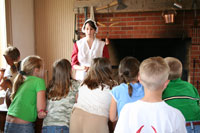FIELD TRIP TOPICS
 Activities for school age students were designed in partnership with the local schools and area educators. The topics explored on site address state learning standards: social studies, language arts, math, science and fine arts. These standards are incorporated into the concepts introduced per grade level. Our emphasis is on experiential learning using hands on demonstrations during a scheduled field trip. Activities for school age students were designed in partnership with the local schools and area educators. The topics explored on site address state learning standards: social studies, language arts, math, science and fine arts. These standards are incorporated into the concepts introduced per grade level. Our emphasis is on experiential learning using hands on demonstrations during a scheduled field trip.
Educational resource trunks are available to assist teachers and students with background information prior to their visit to the Stephenson House. These trunks contain teachers' guides, lesson plans, artifacts, books, maps, DVDs, and suggested classroom activities to use before, during, and after visits to the house. Resource trunks are available for use for students in grades K through 7. Trunks are delivered to the school after an appointment for a field trip is made. It is suggested that teachers make an appointment for a field trip four weeks prior to their intended visit.
 Educational Concepts Brochure Educational Concepts Brochure
TELL US WHAT YOU THINK!
Field Trip and Educational Trunk Evaluation Form
Focus: Life Then and Now: Comparing and Contrasting Life in 1820 With Today
STORIES & SONGS. Learn stories and songs from the early 1800s.
ABC LESSON. Exploring the ABCs through the use of an early 19th century battledore.
KITHCEN CHORES. Kitchen chores necessary to start the day (includes helping to make a period recipe).
YOUR HOUSE, OUR HOUSE. Looking at the differences between the Stephenson House and your house.
SEASONS OF GARDENING AT STEPHENSON HOUSE. This topic is weather dependent and focuses on the current season. Spring focuses on preparing the soil, planting, and examining what is growing in the garden. Fall focuses on seeds; identification, differences and storage.
Focus: To be decided by teacher
At this time, Stephenson House does not have trunks for 1st grade curriculums. Teachers wanting to bring their class have the option of choosing from our already established ‘Topics’ and having a trunk designed around their individual class needs. Contact the director (618-692-1818) for more information on developing a trunk for your class.
Focus: Life of Young Children
GAMES. The types of games played by children in 1820. This topic is weather permitting and is either conducted on the front lawn or in the orientation room.
THE STEPHENSON CHILDREN’S BEDROOM. Discussion of the types of clothing worn by children during the early 19th century, taking a bath and hand-held toys.
HERBS. Identifying herbs from the garden by touch and smell; uses of herbs for cooking, fragrance and medicines.
LIFE IN THE SERVANT’S QUARTERS. Lives of the indenture servants and their children. Comparing the lives of the children who lived at Stephenson House.
Focus: Weather, Its Importance in Life during the 1820, What Is the Style of the Stephenson House
SYMMETRY & WEATHER. Students look for symmetry throughout the house and discuss how weather impacted daily life at the house.
THE STEPHENSONS: A STORY OF EARLY ILLINOIS. Students watch and discuss the documentary video.
FOOD PRESERVATION. Discussion of how the Stephensons preserved food year-round and how the weather affected the food supply. A hands-on activity is also conducted.
LAUNDRY DAY. It’s laundry day at the house; some students will carry water buckets using the yoke; all have a turn scrubbing, rinsing, and hanging up the laundry.
Focus: Images of Greatness-Stephenson and His Time
FOLK ART & CRAFTS. Discuss arts and crafts made within a home that demonstrate decorative and functional uses.
LIFE IN THE MILITIA. Learn about the day-to-day activities of a soldier posted at Fort Russell during the War of 1812. Students will see examples of clothing, weapons, equipment, as well as, learn basic drill.
IMAGES OF GREATNESS. This station focuses on men and women who had a significant impact in Edwardsville, St. Louis and Illinois.
COOKING IN THE KITCHEN. The types of recipes and utensils commonly used in an 1820 kitchen are presented. Students are asked to identify various kitchen implements that are vastly different from the modern counterpart. Also, a demonstration of how to start a fire with flint and steel.
Focus: Indentured Servants and Their Role in the Success of the House
ARCHEOLOGY. How to discover the past by digging in the dirt. This hands-on activity teaches students how to identify fragments found during digs at historic sites.
INDENTURED SERVATUDE & SLAVERY. The difference between a slave and an indentured servant is discussed with students. A lesson using ‘runaway’ ads from area papers brings period social perceptions to life.
TRADES & APRENTISHIPS. What kinds of trades were essential to society during the early 19th century? What is an aprentiship and how does it work?
SCAVENGER HUNT. While touring the house, students need to find six objects that are functional and/or decorative.
Focus: To be decided by teacher
At this time, Stephenson House does not have trunks for 6th grade curriculums. Teachers wanting to bring their class have the option of choosing from our already established ‘Topics’ and having a trunk designed around their individual class needs. Contact the director (618-692-1818) for more information on developing a trunk for your class.
Focus: The Young Adolescent and social customs/In October-the mourning of Col. Stephenson
THE STEPHENSONS: A STORY OF EARLY ILLINOIS. Students watch the documentary video about the Stephenson family then discuss social customs.
WAR OF 1812: FACTS & MYTHS. Common myths regarding the history of the War of 1812 are presented and discussed.
COMMON OBJECTS: DAILY USES. Seven items from the kitchen and/or servants quarters are chosen for discussion. How these common objects affect the daily life of a servant is the focus.
MOURNING CUSTOMS. This station is conducted during the month of October while the mourning exhibit is on display throughout the house. Mourning customs practices at the time of Col. Stephenson death are the focus.
Teachers are encouraged to contact the Director at 618-692-1818 to discuss teaching and learning concepts that would be of importance to the needs of their specific grade level. The coordinator, with the teacher, can customize a tour or field trip for their grade level and curricular needs.
|





